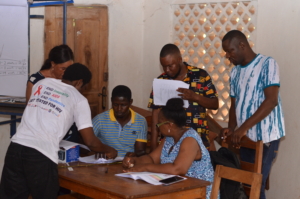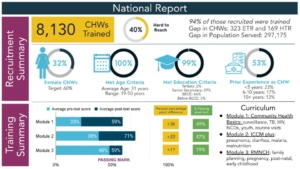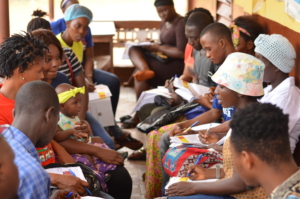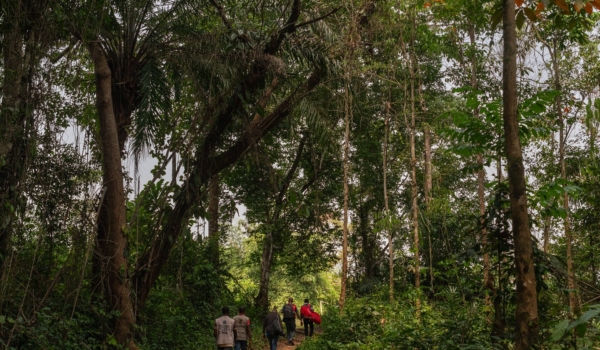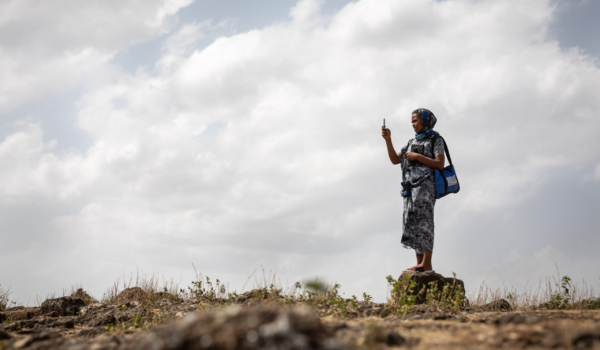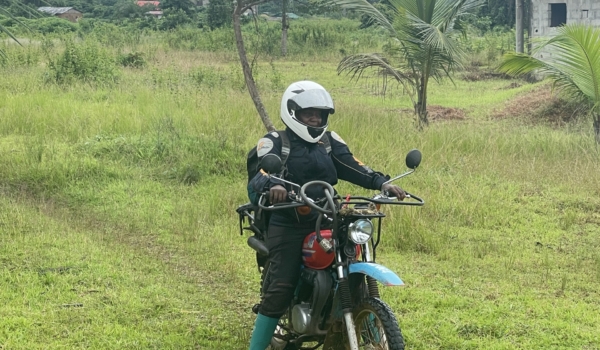Lessons from the training and recruitment of 8,000+ CHWs in Sierra Leone
By Joseph B. Sesay, Last Mile Health; Elizabeth Musa, Sierra Leone Ministry of Health; and Meredith Kimball, Exemplars in Global Health
“Community health worker programs have gained global momentum. As a country we must not be left behind,” said Dr. Brima Osaio Kamara, Director of Primary Health Care within Sierra Leone’s Ministry of Health. Speaking at an event sharing research results on the strengths and challenges of community health worker (CHW) recruitment and training, Dr. Kamara emphasized the urgency of fully scaling a strong, sustainable CHW program in Sierra Leone—a key tool in bringing quality primary care to millions. Last Mile Health conducted this research in partnership with the Ministry of Health, supported by the Exemplars in Global Health program.
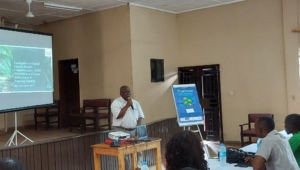
Dr. Brima Osaio Kamara shares remarks on the Exemplars research at a subnational dissemination event in Makeni, Sierra Leone.
In rural and remote communities, CHWs represent a vital link to lifesaving care: they provide routine visits; assess, classify, and treat diseases like malaria, pneumonia, and diarrhea; refer patients to health facilities; and play a key role in pandemic prevention, preparedness, and response. In 2021, the Ministry of Health embarked on an ambitious new effort to recruit and train an integrated cohort of 8,000+ new community health workers, with support from partners including Last Mile Health. Together, the Ministry and Last Mile Health worked to review the curriculum and strengthen quality assurance and reporting during training to ensure CHWs have the skills, knowledge, and support to provide consistent and high-quality care.
On June 6, 2023, the Ministry and Last Mile Health conducted a national dissemination of the results on the recent CHW recruitment and pre-service training—the first of two phases of the Exemplars in Global Health research. Together, participants developed concrete recommendations and action plans to improve data quality; reconsider recruitment criteria or implement support systems to make the policy’s criteria realistic for the available workforce; and strengthen training effectiveness and quality. Building on a series of subnational dissemination workshops for stakeholders across the country, the national dissemination marked a critical step in the monitoring and evaluation of Sierra Leone’s national community health worker program, now comprising a fully integrated cadre trained across a comprehensive primary health service package.
For the Sierra Leone CHW program, Exemplars in Global Health is providing resources to support technical assistance to gather data for program improvement through quality monitoring, evaluation, research, and learning (MERL). Research on training and supervision is not often conducted to provide immediate data for decision-making and learning, making this research valuable both for Sierra Leone’s growing program and for other countries aiming to build and strengthen their own programs. “It’s important for us to learn from the data and use it to make decisions,” explained Elizabeth Musa, National Coordinator of the Ministry’s CHW Hub. “We know the significance of this: it is about quality.”
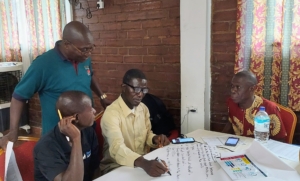
Participants develop ideas at a subnational dissemination of the Exemplars results in Bo, Sierra Leone.
The research: Exemplars in Global Health
A global research effort incubated by Gates Ventures, Exemplars in Global Health unites experts, funders, and partners to help health leaders make strategic decisions, allocate resources, and craft evidence-based policies. In past work, Exemplars and Last Mile Health published findings on community health worker programs in Bangladesh, Brazil, Ethiopia, and Liberia that support the shaping and optimization of other country CHW programs—including in Sierra Leone.
In its national program, “Sierra Leone is currently moving from policy to implementation,” explains Christina Bowles, Last Mile Health’s Sierra Leone Program Director. “The overall goal of this work is to respond to the Ministry and partner demand for actionable information about the early roll-out of Sierra Leone’s new CHW program. This data will inform decisions on policy, implementation, and advocacy to ultimately improve performance of the program and bring high quality primary healthcare to rural and remote communities across the country.”
The first phase of the Exemplars research reviewed the initial stages of Sierra Leone’s CHW program: recruitment and training. Leveraging data from training assessments, quality assurance forms, surveys, and the recruitment database, the research had three key objectives: (1) examining CHW recruitment outcomes related to gender, education, and age; (2) exploring CHWs’ readiness to provide services; and (3) assessing the quality of CHW training.
Findings, dissemination, and reflections
Following the subnational disseminations, the Ministry and Last Mile Health convened stakeholders in Freetown to share findings at the national level. Reviewing and reflecting upon data across all three research objectives, participants raised critical questions and developed solutions regarding how best to build and sustain a quality community health worker program to serve patients at Sierra Leone’s last mile.
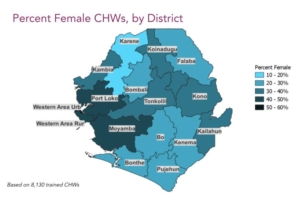
Distribution of female CHWs by district within Sierra Leone. It is possible that districts with fewer female CHWs will have challenges with the delivery of reproductive, maternal, newborn, and child health services.
Regarding recruitment, the study analyzed CHW demographics including age, education level, and gender: key metrics for informing future recruitment targets and needs. Data showed that on average, only 32% of trained CHWs were female—falling short of the 60% policy target and affirming the critical need for such a target. Women were nearly twice as likely as men to drop out between recruitment and completion of training (8.1% vs. 4.6%), a substantial and statistically significant difference. Furthermore, when controlling for age, education, prior experience, English proficiency, and post-test scores, men have 3.8 times the odds of being selected as a peer supervisor compared to women.
- The gender gap in the community health workforce has a serious impact on gender equity in healthcare, explains Joseph B. Sesay, MERL Technical Advisor with Last Mile Health: “CHWs provide a lot of reproductive health services, and women may feel more confident discussing maternal health issues with a fellow woman than a man.” There are also significant contextual barriers to women engaging in the CHW program: with limited agency on how they spend their time due to traditional gender norms which ascribe more caretaking and household duties to them, women often don’t have capacity to undertake the work required of a CHW. (A recent gender assessment examines similar barriers women face in becoming paid, professional community health workers as part of Liberia’s national program.)
- At the dissemination, participants reflected that the goal of 60% female CHWs will remain out of reach without strong and intentional community engagement to help shift attitudes regarding female involvement. Facilitating support and encouragement from female candidates’ husbands can significantly improve their likelihood of taking on this work.
Further recruitment findings placed the average age of CHWs at 29 for women and 32 for men, with data suggesting nearly all candidates met the national policy criteria (20-45 for men, 20-50 for women). Nearly all learners met the new education requirements outlined in the policy, having completed Basic Education Certificate Examination (BECE) or its equivalent (representing a high-school level education). When monitoring how the program evolves, the Ministry and partners should take into consideration that age restrictions for CHW candidates eliminate older (often more experienced and respected) candidates from consideration—and some stakeholders expressed concern that a younger cohort represented a higher risk of attrition. Additionally, the new policy has increased the education requirements in order to improve the effectiveness of training and quality of care. Overall, this goal is being met; however, a combination of high education requirements and low pay could also lead to attrition over time, as highly educated candidates are likely to seek other employment opportunities.
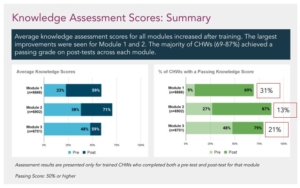
Average knowledge assessment scores for all modules increased after training. The majority of CHWs (69-87%) achieved a passing grade on post-tests across each module.
Regarding CHW readiness to deliver care, the research found that average knowledge scores improved after training on each topic. The majority (55%) of CHWs achieved a passing grade on all their post-training assessments. However, 14% of CHWs averaged a score below 50% across all topics.
- Approximately 9% of learners reported English was difficult to understand. Learners who reported difficulty had lower average post-test scores (71% vs. 77%) and were less likely to pass (88% vs. 95%) than those who did not report difficulty with English. This finding suggests that offering training materials in local languages could help trainees that may meet the education requirement but still struggle with English comprehension.
- For CHWs who did not pass assessments but have been deployed to their communities, a plan is needed to ensure they develop and maintain competency in all skill areas.
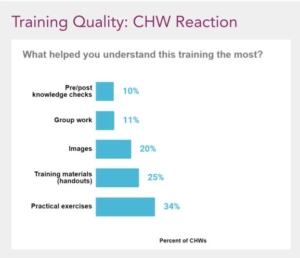
CHWs found practical exercises and training materials (handouts) to be most useful. Responses were similar across districts.
On training quality, findings demonstrated that practical exercises were most frequently reported as the component that helped CHWs best understand the training, while payment delays and facility challenges (such as a shortage of training materials and insufficient food and toilet facilities) caused setbacks for training cohorts: without adequate facilities, sufficient training materials, and timely pay for all involved, training could not proceed according to plan.
- The value of quality assurance visits to training sites was confirmed as critical to improving quality in real time, addressing challenges with facilities and resources; the group agreed to continue prioritizing this investment.
Overall, the dissemination discussion established a stronger understanding of strengths and weaknesses of the pool of community health worker candidates, identified areas for improvement in assessments and training sites, and underscored the importance of continued work toward gender parity and quality training to improve care for patients. The timely, action-oriented use of data is significant, explained Mohamed Kai Wusoh, a CHW Focal from Falaba District. “Most of the other organizations that undertake something, nobody ever comes back to us,” he said. “But now, we are discussing what went on during the recruitment and training to see what are the successes, challenges, failures.”
Looking ahead: Quality data, quality training, and quality patient care
“Quality starts with the training. If the input is poor, the output will be poor,” said Dr. Brima Osaio Kamara of the Ministry of Health. “You can do a good training, but the logistics are also very key. We need to have a holistic package to get a good quality.”
At present, Last Mile Health Sierra Leone is summarizing dissemination meeting discussions into a final report the Ministry can leverage for quality improvement in upcoming recruitment and training. Next up: the second phase of the Exemplars research. “Now, we will evaluate CHW system performance, all with the idea of creating a replicable monitoring and evaluating system that can be used after handover from Last Mile Health to the Ministry,” explains Last Mile Health’s Christina Bowles.
The Exemplars research will inform the development of stronger and more standardized training, with community health workers equipped to provide quality care and supported by an effective health system that can identify and address areas for improvement in real time—a system the Ministry will ultimately manage independently. Research will culminate with a global learning product that can inform future programs.
Quality data drives quality training—and quality training, Dr. Brima Osaio Kamara emphasized, drives quality care. “All we’re looking at is universal health coverage,” he explained. “We are serving the communities at the last mile.”

